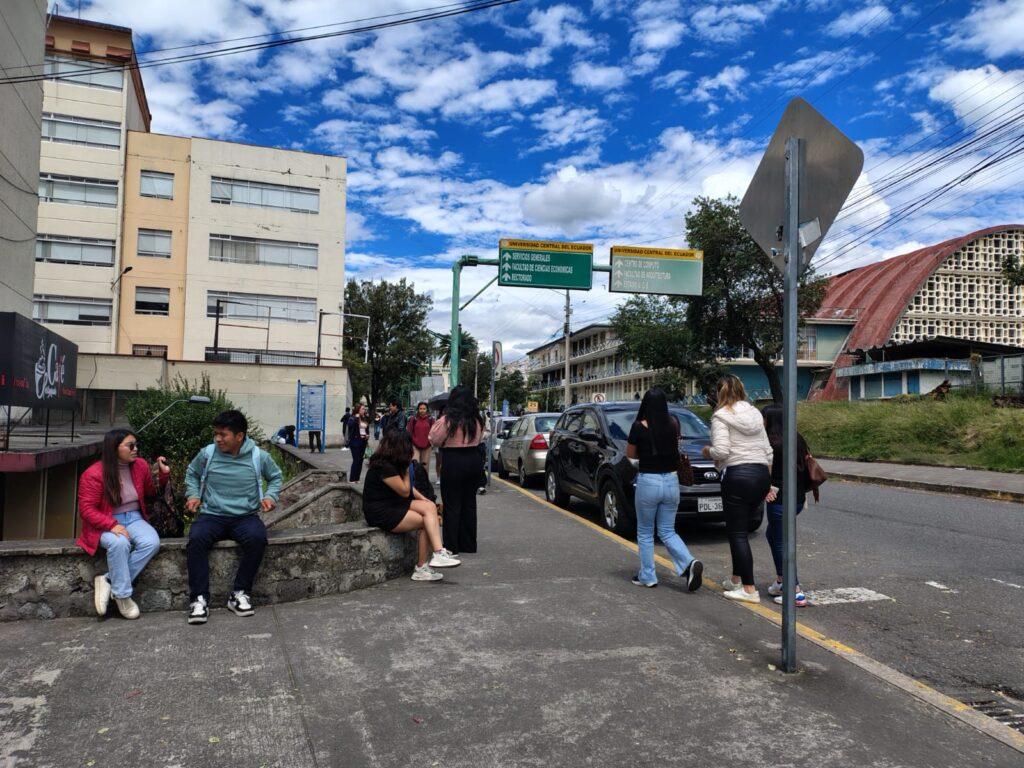Students walk briskly back and forth across Ecuador’s Central University campus in Quito, Ecuador.
It’s a pleasant morning on the square in front of the student union, but these are complicated times for those hoping to study abroad in the United States.
“The situation is really sad,” said second-year visual arts student Valentina Haro, sitting on the grass with friends. “Because it doesn’t have anything to do with something that people have done, but it’s an individual decision from someone in power in the US.”
In late May, US officials suspended visa interviews for international students looking to study in the United States. They say they’re revamping policies to include the vetting of applicants’ social media accounts. It’s the latest move in the Trump administration’s increasingly harsh measures against international students, which are impacting both in the United States and abroad.
Haro said she knows people who have been hoping to study abroad in the United States. But now, that seems nearly impossible. She’s also concerned for those who are already there.
In March, US officials began canceling visas for hundreds of international students studying in the US. In particular, the visas of those who may have been vocal about their political views, in the streets or online.
“It might be more than 300 at this point. We do it every day. Every time I find one of these lunatics, I take away their visa,” said US Secretary of State Marco Rubio in defense of the measures in late March.
An estimated 4,700 international students have been impacted. US officials say the crackdown on student visas is essential for defending national security. There are roughly 80,000 Latin American students in the United States. Many are concerned.
“This whole situation this semester made me start doing therapy this week. I’m feeling so bad and so confused about what to do with my future that I had to seek support,” said a PhD student from Brazil studying at a university on the East Coast. “Also, this has affected my academic performance a lot.”
She asked not to be identified for fear of reprisals.
“I’m the first generation who grew up after the dictatorship [in Brazil] was over. But I feel like all that comes back a lot to my mind right now, here in the US. So, I’m afraid of disappearing — ending up in a prison in a concentration camp.”
International students have been detained and threatened with deportation.
On March 8, ICE agents detained and arrested recent Columbia University graduate Mahmoud Khalil. His is the most high-profile case.
On March 28, third-year University of Florida student Felipe Zapata Velásquez was pulled over, detained and deported after driving with a suspended license in Gainesville, Florida.
“I’m an international student,” he told an officer in body cam footage of the arrest that was released.
He is now back in his home country, Colombia, despite protests from a student group that demanded his release.
“The feeling that I engage with is a mix of kind of amazed and lost and confused,” said Rafael Ioris, a Brazilian professor of Latin American history at the University of Denver. “It’s impacting academic exchange, students’ exchange between Brazil, between Latin America and the United States.”
Professor Ramiro Noriega, former dean of Ecuador’s University of the Arts, said he has high esteem for higher education in the United States, but what he’s seeing now makes him very sad.
“These decisions are clearly going to impact people, individuals and communities,” he said. “Because we know that in today’s world, the best university programs depend on the relationship between local researchers and researchers from the rest of the world.”
But the climate of fear has led some students to reconsider their dream of studying in the US.
Marllon Rocha, from Rio de Janeiro, Brazil, was accepted with funding to do his doctoral work at a prestigious US university. He turned it down last month.
“Probably, the Trump administration policies would never affect me,” Rocha said. “But the idea in your head that you never know what could happen, [it] changes the way that you do your research.”
“So, I said, ‘No, I can’t do it,’” he said. “Because it would be around-the-clock surveillance of who I talk to, what I say, where I am. If I’m in the wrong place, at the wrong time. It’s a suspension of rights.”
The United States has long been the top destination for Latin American and Caribbean college students looking to study abroad. Countless Latin American leaders studied in the US, including the current presidents of Costa Rica, the Dominican Republic, Ecuador, Haiti and Jamaica.
But these students are increasingly going to look for other options elsewhere.
Brazilian PhD candidate Marllon Rocha says he’ll probably now stay in Brazil for his post-graduate work.
And he is likely not the only one.
